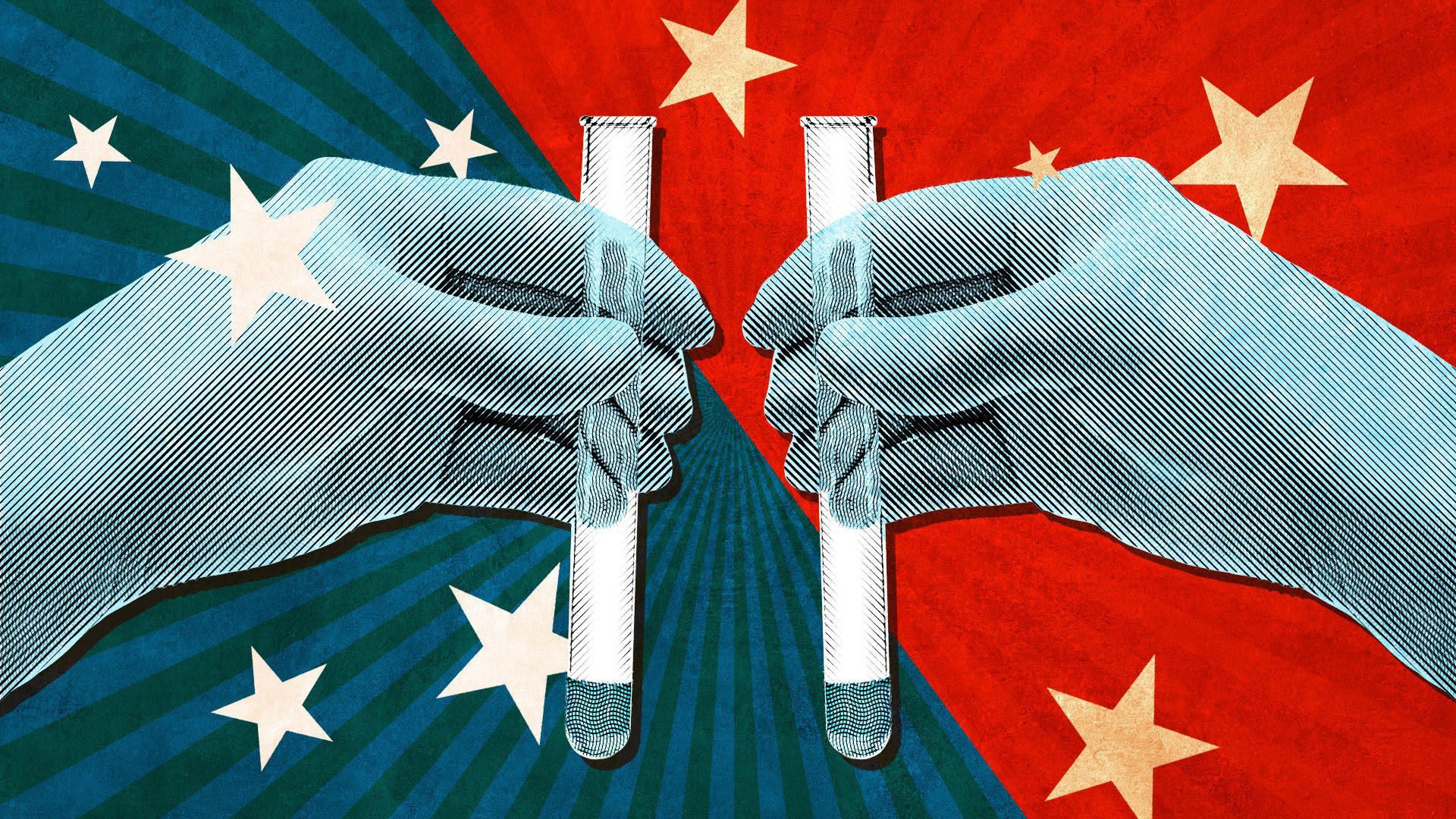| | | | | | | Presented By PhRMA | | | | Axios Vitals | | By Tina Reed ·Jun 25, 2021 | | Good morning. Today's newsletter is 921 words, or a 3-minute read. Situational awareness: India announced this week the emergence of a new version of the Delta variant of COVID-19, called Delta Plus, which may be more transmissible and resistant to COVID-19 treatments. - Studies are ongoing in India and globally to test the effectiveness of vaccines against this mutation, Reuters reported.
| | | | | | 1 big thing: Gun injury research gains steam |  | | | Illustration: Lazaro Gamio/Axios | | | | A little more than a year after federal funding became available for gun injury research, scientists and advocates say they've seen flood of interest, Axios' Marisa Fernandez writes. - The recipients of this new federal funding say their research will be critical start to understanding gun violence and injuries in the U.S.
Why it matters: Gun violence is the least researched of the 30 leading causes of death, largely because Congress had banned such research. But $25 million was made available last year. - That federal funding now supports a range of research projects, including studies that try to determine whether gun injuries would decrease if doctors asked their patients whether they own any guns.
What they're saying: "It's opening up whole new areas of junior researchers into the field," Emmy Betz, director of the firearm injury prevention initiative at University of Colorado and an NIH grant recipient, tells Axios. What to watch: The Biden administration has proposed doubling the funding to $50 million. Share this story. |     | | | | | | 2. Drug price negotiations' staying power |  | | | Illustration: Shoshana Gordon/Axios | | | | Prescription drugs — which represent just 10% of national health spending — have remained a persistent issue on Capitol Hill for a reason, the Kaiser Family Foundation's Drew Altman writes in his latest Axios column. The big picture: What makes drug price negotiation a powerful idea — with bipartisan support from more than 80% of the public — is not the savings to the government, Altman says. It's the potential to lower costs for patients and businesses. - H.R. 3 and principles for drug cost legislation recently released by Sen. Ron Wyden would give employer plans and privately insured people access to government negotiated prices, in addition to Medicare.
- Polling shows criticisms that drug price negotiation could reduce the availability of drugs, and research and development on new drugs could erode support. But those criticisms have been made for years and have not sunk in.
- The staying power of the idea and the number of people who would benefit are a big driver for Democrats. That's also why the industry will oppose these proposals with everything at its disposal.
Meanwhile, there is one incidental winner here: America's hospitals. They represent 31.4% of health spending and the focus on drug costs keeps them out of the crosshairs. Go deeper. |     | | | | | | 3. The stock market's bet on mental health care |  Data: Yahoo! Finance; Chart: Axios Visuals Mental health care provider LifeStance Health has traded publicly for two weeks, and its stock has soared 57% from its $18 IPO price, giving the company a $10.6 billion valuation, Axios' Bob Herman writes. - LifeStance's business rests on the idea that demand for mental health services will continue to grow in the wake of the pandemic.
- LifeStance's business model is simple: People aren't getting enough care for their mental health conditions. So, build new clinics, attract mental health providers with better-paying, in-network insurance contracts, and then take a cut.
"There's not a shortage of clinicians. There's a shortage of clinicians accepting commercial insurance," said LifeStance CEO Mike Lester, who owns roughly 6% of the company, a stake worth more than $600 million. |     | | | | | | A message from PhRMA | | Out-of-pocket costs don't have to be out-of-this-world confusing | | |  | | | | The way insurance covers your medicine is too complicated. What you pay out of pocket for medicines should be more transparent, more predictable and more affordable. Because the system should work for patients. Not the other way around. Get the facts. | | | | | | 4. Surprise ambulance bills will persist | | Calling an ambulance will still leave patients at risk for big and surprising bills, Axios' Caitlin Owens writes. - Congress' ban on surprise bills takes effect next year, but ambulances are exempt — and they're a particularly painful source of unexpected charges.
By the numbers: Just over half of emergency ground ambulance rides resulted in an out-of-network charge, according to a new KFF analysis. - In Washington, California, Florida, Colorado, Texas, Illinois and Wisconsin, more than two-thirds of emergency ambulance rides generated an out-of-network charge.
The bottom line: "The regulation and delivery of ground ambulance services could present complexities beyond those involved in preventing other surprise medical bills," the report concludes. - "Yet, from the perspective of patients, ambulance rides are exactly the kinds of situations where they feel powerless to avoid surprise bills."
|     | | | | | | 5. A new world order for science |  | | | Illustration: Sarah Grillo/Axios | | | | The world's scientific power centers have shifted — and now researchers and nations collaborating on science with the U.S. and China face getting caught up in their broader competition, Axios' Alison Snyder writes. Driving the news: Science is front and center in a massive bill focused on U.S. competition with China that passed the Senate and is now being considered by the House. - The U.S. Innovation and Competition Act includes provisions that would bring more oversight to international research and partnerships to try to address foreign influence on research and IP theft. But some worry they could stifle collaboration in some fields.
- A Nature analysis published last week suggested the growth of collaborations between the U.S. and China, which are among each other's top scientific collaborators, may be slowing, whereas "the share of papers [from China] co-authored with some other nations, such as the United Kingdom and Australia, is rising."
My thought bubble: These shifting sands could have major implications for health care in areas such as cancer research, which increasingly relies on cross-border collaboration for clinical trials. Yes, but: During the Milken Institute Future of Health Summit this week, experts told me they haven't yet seen recent geopolitical tensions impacting their work, in the cancer arena at least. - "Were the world to decide it doesn't want to work together on fighting cancer, that would have a devastating impact to clinical trials," said John Oyler co-founder and CEO of the biotech BeiGene.
|     | | | | | | 6. Dog of the week |  | | | Photo: Mary Dolan | | | | Meet Clover, a 10-week-old Portuguese Water dog who is making good on his name. - He was recently added to the family, in part to celebrate the vaccination of his parents James Dolan, a senior director at EY-Parthenon, and Mary Dolan, chief of staff and deputy vice president of science & regulatory advocacy at PhRMA.
|     | | | | | | A message from PhRMA | | Out-of-pocket costs don't have to be out-of-this-world confusing | | |  | | | | The way insurance covers your medicine is too complicated. What you pay out of pocket for medicines should be more transparent, more predictable and more affordable. Because the system should work for patients. Not the other way around. Get the facts. | | |  | | The tool and templates you need for more engaging team updates. | | | | | | Axios thanks our partners for supporting our newsletters. If you're interested in advertising, learn more here.
Sponsorship has no influence on editorial content. Axios, 3100 Clarendon Blvd, Suite 1300, Arlington VA 22201 | | | You received this email because you signed up for newsletters from Axios.
Change your preferences or unsubscribe here. | | | Was this email forwarded to you?
Sign up now to get Axios in your inbox. | | | | Follow Axios on social media:    | | | | | |









No comments:
Post a Comment